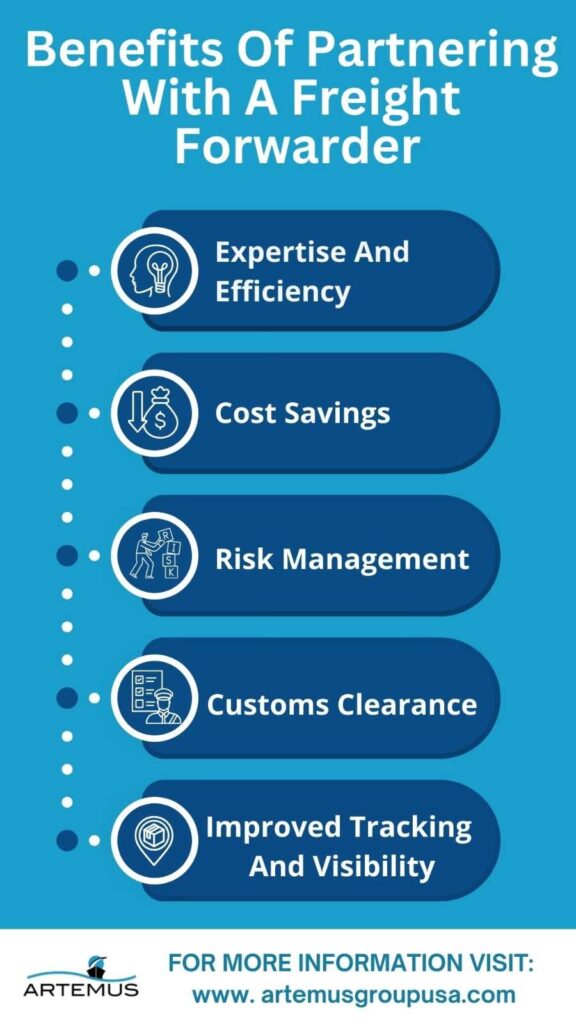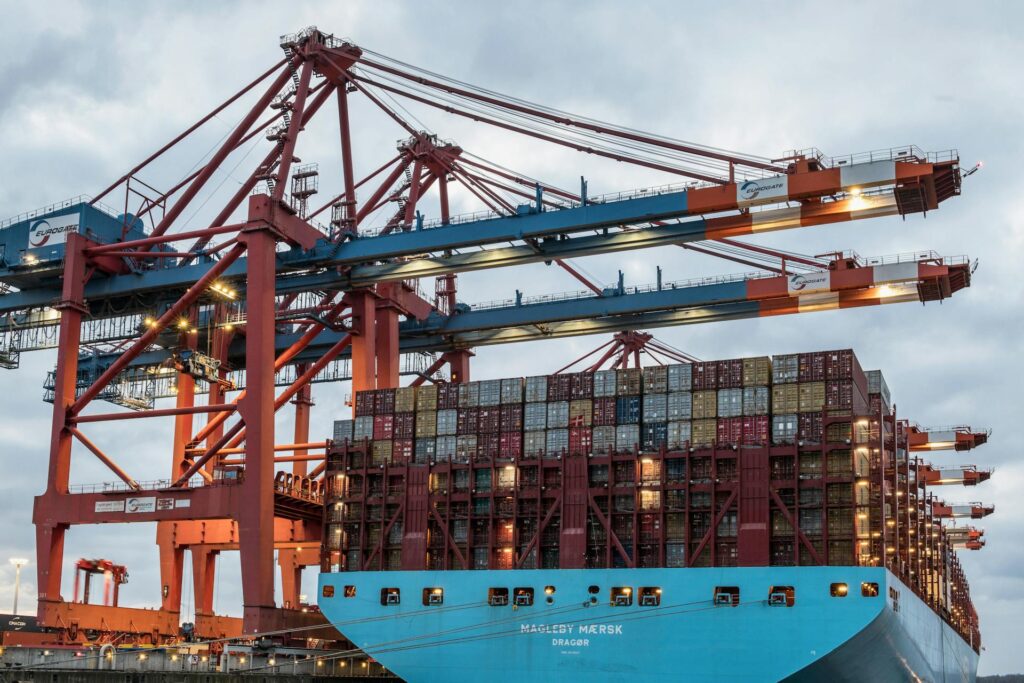
Export Car From USA To Canada: A Guide For 2025
Exporting a car from the USA to Canada can be a smooth process if you understand the necessary requirements. Both

Navigating the complexities of international shipping can be challenging, but freight forwarding is here to simplify the process. Freight forwarding involves coordinating and managing the shipment of goods from one location to another, utilizing various transportation methods such as air, sea, rail, and road.
Acting as intermediaries between shippers and carriers, freight forwarders handle customs documentation, shipping regulations, and other logistical hurdles, ensuring that goods are transported efficiently and safely across borders.
Artemus Transportation Solutions is dedicated to simplifying the complexities of freight forwarding. Our state-of-the-art software for Importer Security Filing (ISF) and Automated Manifest System (AMS) ensures that your shipments meet all U.S. compliance standards with ease.
By automating and integrating these critical processes, we help freight forwarders align their filings perfectly with regulatory requirements, reducing errors and enhancing operational efficiency.
Table Of Contents
A freight forwarder is a key player in the world of logistics and global trade, acting as an intermediary between shippers and carriers. These professionals are responsible for organizing the movement of goods from one destination to another. They handle a variety of tasks including transportation, documentation, customs clearance, and insurance.
Freight forwarders coordinate with various carriers such as airlines, shipping lines, and trucking companies to ensure that goods are transported efficiently and comply with all necessary regulations.
Related: Freight Forwarders Arrange Transportation Only By Ocean Shipping

Related: Ocean Freight Documentation For Imports: A Crucial Checklist
Freight forwarding is vital for ensuring a reliable supply chain, as it handles the complex logistics of global trade, providing cost savings, efficiency, and compliance with regulations. Here are the key reasons why freight forwarding is essential:
1. Expertise In Logistics: Freight forwarders manage the entire logistics process, ensuring smooth transportation of goods from one point to another. They handle every detail, including booking transport and tracking shipments.
2. Cost Savings: They leverage established relationships with carriers to negotiate better rates and consolidate shipments, reducing overall shipping costs.
3. Customs Clearance: Freight forwarders manage complex customs regulations and paperwork, ensuring compliance and preventing costly delays due to incorrect documentation.
4. Risk Mitigation: They ensure proper packaging and labeling of goods, protecting them from damage and avoiding delays.
5. Efficiency: By handling all shipping details, freight forwarders free up your time and resources, allowing you to focus on your core business.
6. Global Network: They have a vast network of partners around the world, making it easier to move goods between countries and across borders.
7. Real-Time Tracking: Freight forwarders provide real-time updates on the status of your shipment, ensuring transparency and reliability.
8. Insurance and Claims Assistance: They help navigate the complexities of shipping insurance and assist with claims, providing peace of mind when transporting valuable or high-risk goods.
9. Adaptability: Freight forwarders stay updated with industry changes and adjust their strategies accordingly, ensuring your shipments are handled with the most effective methods.
10. Market Insights: They offer valuable insights into market trends, helping businesses make informed decisions about shipping routes and methods.
Related: How To Get A Freight Broker License?
Understanding how freight forwarding works can help businesses streamline their logistics operations and ensure their shipments arrive on time and in good condition. Here’s a detailed look at the freight forwarding process:
The freight forwarding process begins when a shipper contacts a freight forwarder to book a shipment. This involves providing details about the goods being shipped, including their size, weight, destination, and any special handling requirements. The freight forwarder uses this information to determine the best shipping method and route.
Once the shipment details are finalized, the freight forwarder arranges the transportation of the goods. This can involve multiple modes of transport, such as sea, air, rail, or road. The freight forwarder selects the most efficient and cost-effective transportation options based on the shipment’s requirements and destination.
Freight forwarding involves handling a range of documentation required for international shipping. This includes:
The freight forwarder ensures that all necessary documentation is completed accurately and submitted to the relevant authorities.
Before the goods can enter the destination country, they must clear customs. The freight forwarder handles customs documentation and compliance, ensuring that the shipment meets all regulatory requirements. This includes preparing and submitting the Importer Security Filing (ISF) and Automated Manifest System (AMS) documents, if applicable.
If necessary, the freight forwarder arranges for warehousing services. Goods may be stored temporarily before being forwarded to their final destination. The forwarder also coordinates the distribution of the goods to ensure they reach the consignee on time.
Throughout the shipping process, the freight forwarder monitors the progress of the shipment. They provide updates to the shipper and consignee, tracking the shipment’s location and addressing any issues that may arise. This includes managing delays or handling any unexpected challenges.
Finally, the freight forwarder arranges for the delivery of the goods to the consignee. This may involve coordinating with local delivery services or transport providers to ensure that the shipment reaches its final destination in good condition.
After the goods have been delivered, the freight forwarder may offer additional support, such as handling any claims for damaged or lost goods and providing guidance on future shipments
Related: How To Become A Freight Broker With No Experience?
Freight forwarding is a crucial service in international trade that involves the coordination and shipment of goods from one place to another via multiple modes of transportation. It’s an essential part of the logistics chain, ensuring that cargo is transported efficiently and cost-effectively. Here’s a breakdown of the freight forwarding process:
Related: What Is Freight Forwarder Vs Broker: 6 Key Differences
Their services are designed to ensure that shipments move smoothly, efficiently, and cost-effectively. Here’s an overview of the key services provided by freight forwarding companies:
Freight forwarders coordinate and manage the transportation of goods via various modes, including ocean freight, air freight, road freight, and rail freight. They select the most appropriate carriers and routes to optimize delivery time and costs.
Handling the complex paperwork required for international shipping is a crucial service. Freight forwarders prepare and manage documents such as bills of lading, commercial invoices, and packing lists. They also ensure compliance with local and international regulations, including customs requirements and import/export laws.
Freight forwarders frequently serve as customs brokers, assisting in the clearance of goods through customs procedures. They handle the submission of necessary documentation and payment of duties and taxes, ensuring that shipments meet all regulatory requirements and avoid delays.
To protect against potential loss or damage during transit, freight forwarders offer cargo insurance. This insurance provides financial coverage in case of accidents, theft, or damage, giving clients peace of mind.
Many freight forwarders provide warehousing solutions, offering storage for goods before, during, or after transit. They may also handle distribution, managing the logistics of delivering goods from the warehouse to their final destination.
Some freight forwarders offer inventory management services, helping businesses track their stock levels, manage replenishments, and optimize storage. This service is particularly valuable for companies with large volumes of goods and complex supply chains.
Freight forwarders can consolidate shipments from multiple suppliers into a single container, reducing shipping costs. Conversely, they can deconsolidate large shipments into smaller loads for distribution to various destinations.
Freight forwarders provide expert advice on optimizing supply chains. This includes evaluating logistics strategies, recommending improvements, and helping businesses streamline their operations for better efficiency and cost savings.
Freight forwarding companies offer tracking services that provide real-time updates on the status and location of shipments. This visibility helps businesses monitor their cargo and manage their supply chain more effectively.
Depending on the freight forwarder, specialized services may be available, such as handling hazardous materials, temperature-sensitive cargo, or oversized shipments. These services require specific expertise and equipment to ensure safe and compliant transportation.
Related: How To Start A Freight Forwarding Business? 10 Easy Steps
Freight forwarding is a critical component of global trade, facilitating the movement of goods from one location to another. Whether you’re a business owner looking to streamline your logistics or a consumer curious about how goods are transported, understanding the advantages and disadvantages of freight forwarding is essential.
Related: How To Choose A Freight Forwarder? 10 Critical Aspects
Artemus offers a comprehensive platform that seamlessly integrates and automates Importer Security Filing (ISF) and Automated Manifest System (AMS) processes, ensuring efficient compliance with U.S. Customs and Border Protection (CBP) regulations. This user-friendly software solution simplifies data entry, provides real-time updates, and ensures accurate, timely filings to avoid penalties and delays.
With expert support and regular updates to meet the latest regulatory requirements, Artemus streamlines the import process, helping businesses maintain smooth and efficient operations when exporting goods to the USA.
Related: How To Become A Freight Forwarder: A Stepwise Guide
The freight forwarding process involves coordinating and managing the shipment of goods from one location to another, and handling logistics such as documentation, transportation, customs clearance, and warehousing to ensure timely and efficient delivery.
A freight forwarder arranges and coordinates the shipment of goods on behalf of exporters and importers, handling logistics, documentation, and regulatory compliance to ensure efficient and timely delivery.
The principle of freight forwarding involves coordinating and managing the shipment of goods from one place to another using various transportation methods, ensuring efficient, cost-effective, and timely delivery while handling all necessary documentation and regulatory compliance.
A freight forwarder is a company that arranges the transportation and logistics of goods on behalf of shippers, coordinating various carriers and handling documentation to ensure efficient and smooth delivery.

In conclusion, freight forwarding plays a pivotal role in global trade by acting as an intermediary between shippers and transportation services. By coordinating and managing the complex logistics of moving goods from one location to another, freight forwarders streamline the shipping process, ensuring that cargo is delivered efficiently and in compliance with regulatory requirements.
Their expertise in documentation, customs clearance, and route optimization not only simplifies shipping for businesses but also minimizes costs and risks associated with international trade. Ultimately, understanding how freight forwarding works is essential for businesses aiming to navigate the complexities of global logistics successfully.
Related: What Is A Freight Broker & How Do They Work In 2024?

Exporting a car from the USA to Canada can be a smooth process if you understand the necessary requirements. Both

Japan’s trade system is central to its economy, with imports like raw materials and food supporting its industries and population.

Exporting cars from the USA involves complying with legal and customs regulations. It requires proper documentation, including title and registration,
Get In Touch
Artemus’ Software Solutions for ISF, AMS, Japan AFR, eManifest Canada, & Panama B2B filings.